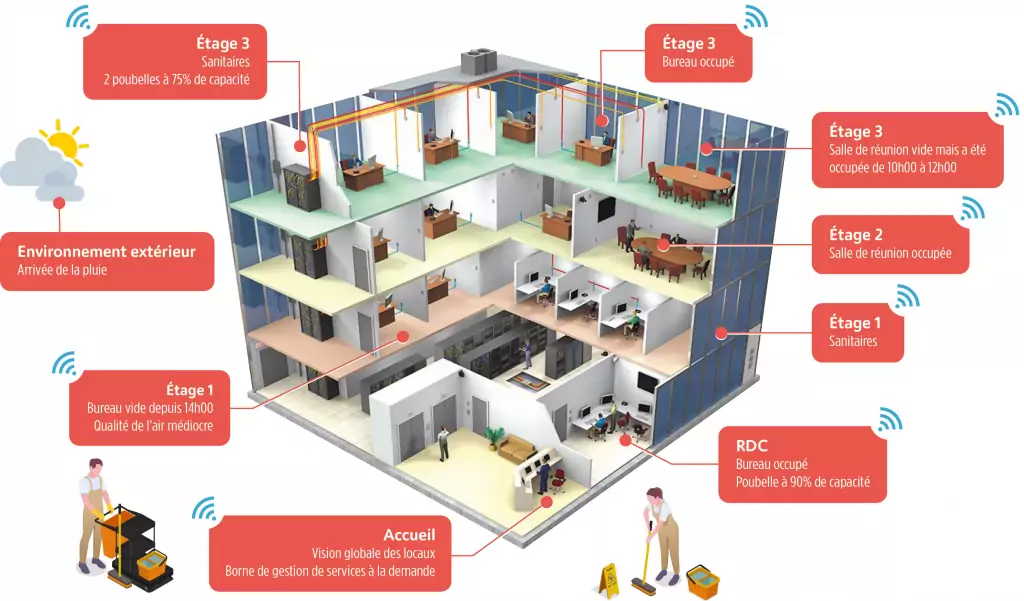The strong requirements in terms of professional hygiene require the profession to innovate in order to adapt to the new hybrid work modes, to the variability of the workplace occupation and thus to justify a greater added value. In order to take the pulse of the building and the satisfaction of its occupants, the digitization of processes becomes essential to support service agents in their daily actions and improve their performance and versatility.
Accelerated by the health crisis, the generalization of teleworking will have deeply impacted the office as we knew it, with its rhythms, its time frame, its regular flows. The hybridization of spaces is now reshuffling the cards of organizations, services to occupants and service providers, challenged by the evolution of work practices, uses and the employee experience
In this paradigm shift, the hygiene and cleanliness players must now demonstrate greater agility to guarantee a high quality of service, by adjusting interventions to a much more variable workplace occupancy and needs, while at the same time meeting the increased demands of companies in terms of health responsibility.
This context, which underlines the relevance of a cleaning model based on usage in favor of a standardized format, immediately raises questions about the posture to adopt in order to anticipate and target expectations and guarantee user satisfaction.

How can we move from a culture of volume, of scheduled services, to agile and more economical processes, in line with real needs?
MoveWORK, a major player in FM, has been providing its technological expertise for more than 10 years in this service optimization dynamic by offering a management platform that orchestrates in real time all cleaning services and those of the entire building ecosystem.
“Our MoveWORK Flow platform brings together all the players in the service value chain and guides companies in a more intelligent orchestration and management of their activities according to the use of the environments and the needs of the occupants” explains Borja Duque, co-founder and director of MoveWORK Iberia.
A new harmony of processes and professions
As an essential condition for maintaining the expected quality, the digitization of the workplace is now laying the foundations for a simplified, more efficient activity that is constantly connected to user practices, the beating heart of the system. Based on the latest IoT and artificial intelligence technologies (activity tracking, service requests, customer feedback, presence detection, filling measurement, environmental quality, etc.), the platform provides an accurate and instantaneous map of living and transit areas, inviting cleaning service providers to gain a broader understanding of spaces, more interactivity and proactivity, and better coordination of day-to-day operations.
“From these new management cockpits, digital technology is an essential tool for triggering and automating certain actions towards the teams in the field,” continues the manager, referring to the various supports, schedules, action plans and quality control grids initiated by MoveWORK Flow.

From a single digital entry point, a real hub for the building, everyone now has the power to address their problems more quickly, resulting in operational time savings and more efficient activity flows. This offers the choice of an operation based on new hybrid models that mix frequency and usage, informing agents of the priority actions to be carried out or planned according to the actual use of the spaces and the needs of the users, when this proves useful and necessary.
“This flexibility, which rationalizes the work of teams and their travel, greatly favors the development of staff skills and brings more meaning to the tasks performed,” adds Borja Duque, for whom, beyond the economic argument, digitalization is working to enhance the value of an entire profession, which is being asked to be increasingly visible in the field.
Building a common language
By guiding cleaning professionals in defining the best balance between frequent or per-use interventions – thanks to the constant traceability of needs – the digitization of processes now seems inseparable from a strategy of sustainable quality and innovation, encouraging the emergence of new on-demand services. This is an essential guarantee of competitiveness in the face of the demands of clients, who see it as an opportunity to concentrate on their core business, but also to satisfy, reassure and offer their employees a pleasant and well managed environment.
Although technology is now available and tailored to the workplace, “it is not the answer to everything,” warns Borja Duque, for whom organizations must first evolve to support this transition.
Free of static and siloed practices, smart FM must be accompanied by a concerted reflection on the formalization of the repository and processes upstream of their digitalization. Of course, a platform will have the function of orchestrating actions and automating data collection in real time; but if the flows are not well defined and transposed beforehand, nor their analysis mastered by the FM pilots, it will not work any magic.
“Technology is helping to generate a new way of thinking about the business, to facilitate this necessary adaptation,” concludes Borja Duque. “Companies that understand this convergence and choose our platform will have all the tools they need to achieve performance, offer new disruptive services, better manage consumables, and keep their promises of healthy and secure environments… And in the end, act for the good of all, including our planet”.


